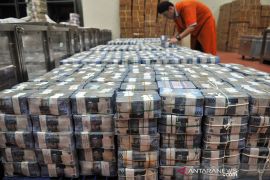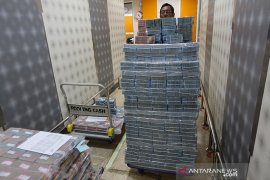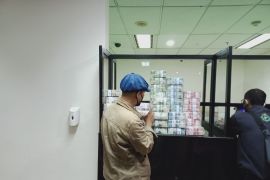"The foreign capital is flowing to the emerging markets. When foreign capital enters BI (Bank Indonesia), it strengthens our foreign exchange reserves," BI`s Senior Deputy Governor Mirza Adityaswara said.Jakarta (ANTARA News) - Indonesias foreign exchange reserves had increased by US$2.2 billion to US$115.7 billion by the end of September 2016 from US$113.5 billion earlier.
Bank Indonesias senior deputy governor Mirza Adityaswara said here on Friday the countrys foreign exchange reserves continued to increase, thanks to the strong flow of foreign capital into the capital market.
He explained that this was on account of the fact that the changes in the interest rate of the US Federal Reserve have become more predictable lately.
"The foreign capital is flowing to the emerging markets. When foreign capital enters BI (Bank Indonesia), it strengthens our foreign exchange reserves," he noted.
The market players also have more confidence now following the success of the first period of the tax amnesty program. During this first phase that ran from July to September, redemption funds worth Rp97.2 trillion were collected while Rp137 trillion came in the form of repatriated funds.
He disclosed that most of the foreign capital that flowed into the country came from market players. That basically meant that it was not sure if the rise in the foreign exchange reserves was on account of foreign capital inflow through repatriation.
"We are still awaiting funds from the repatriation exercise. Therefore, the impact of realization from the tax amnesty program was still to be seen," he added.
In a statement, Bank Indonesia said the rise in foreign exchange reserves was courtesy receipts from tax and oil and gas foreign exchange as well as foreign debts of the government.
It was also the result of the auction of Bank Indonesia Securities (SBBI) in foreign currencies that surpassed the need to pay the governments foreign debts and the SBBI that have attained their due date.
The foreign exchange reserves until the end of September 2016 were enough for financing 8.9 months of imports (or 8.5 months of imports and government's foreign debt payment) and were above the international adequacy standard of around three months of imports.
"Bank Indonesia thinks the foreign exchange reserves could support the external sectors resilience and maintain the sustainability of the countrys economic growth in the future," BIs director of communications Arbonas Hutabarat underlined.(*)
Editor: Heru Purwanto
Copyright © ANTARA 2016









